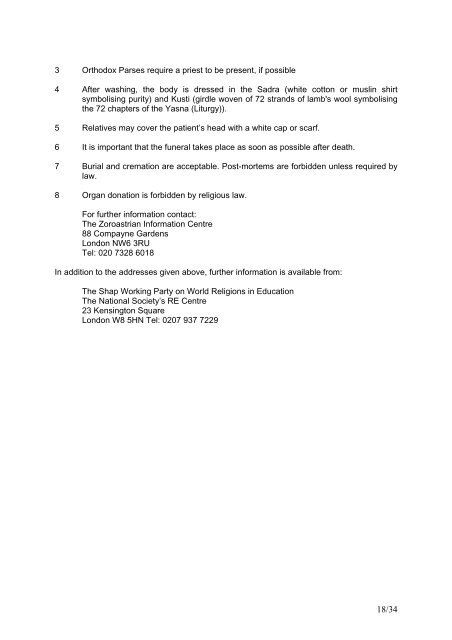Post death procedure - East Cheshire NHS Trust
Post death procedure - East Cheshire NHS Trust Post death procedure - East Cheshire NHS Trust
2 Permission for organ donation is unlikely and post-mortems will be refused unlessabsolutely necessary.For further information contact:Rastafarian Advisory Centre290-296 Tottenham High RoadLondon N15 4AJTel: 020 8808 2185SIKHISM1 Family members (especially the eldest son) and friends will be present if they areable.2 Usually the family takes responsibility for the last offices, but nursing staff may beasked to close the patient's eyes, straighten the body and wrap it in a plain whitesheet.3 Do not remove the 5Ks which are personal objects sacred to the Sikhs:Kesh - do not cut hair or beard or remove turbanKanga - do not remove the semi-circular comb, which fixes the uncut hairKara - do not remove bracelet worn on the wristKaccha - do not remove the special shorts worn as underwearKirpan - do not remove the sword; usually a miniature sword is worn4 The family will wash and dress the person’s body.5 Post-mortems are only permitted if required by law. Sikhs are always cremated.6 Organ donation for transplant is permitted but some Sikhs refuse this, as they do notwish the body to be mutilated.For further information contact the nearest Sikh temple or Gurdwara (see telephonedirectory)Alternatively contact:Sikh Missionary Society UK or Sikh Temple Charity Organisation10 Featherstone Road Tel: 01254 581965Southall.Middlesex. UB2 5AATel: 020 8574 1902ZOROASTRIAN (PARSEE)1 Customary last offices are often acceptable to Zoroastrian patients.2 The family may wish to be present during, or participate in, the preparation of thebody.17/34
3 Orthodox Parses require a priest to be present, if possible4 After washing, the body is dressed in the Sadra (white cotton or muslin shirtsymbolising purity) and Kusti (girdle woven of 72 strands of lamb's wool symbolisingthe 72 chapters of the Yasna (Liturgy)).5 Relatives may cover the patient’s head with a white cap or scarf.6 It is important that the funeral takes place as soon as possible after death.7 Burial and cremation are acceptable. Post-mortems are forbidden unless required bylaw.8 Organ donation is forbidden by religious law.For further information contact:The Zoroastrian Information Centre88 Compayne GardensLondon NW6 3RUTel: 020 7328 6018In addition to the addresses given above, further information is available from:The Shap Working Party on World Religions in EducationThe National Society’s RE Centre23 Kensington SquareLondon W8 5HN Tel: 0207 937 722918/34
- Page 1: ADULTPOST DEATH PROCEDURES(Version
- Page 4 and 5: Roman Catholic ChaplainsFather Pete
- Page 7 and 8: handling policy.) Remove all put on
- Page 9 and 10: SECTION FOUR - PROCEDURES FOR MANAG
- Page 11 and 12: PLEASE NOTE: It is the doctor’s d
- Page 13 and 14: BAHAI1 Bahai relatives may wish to
- Page 15 and 16: 1 The relatives of a Jainist patien
- Page 17: 1 There are no special requirements
- Page 21 and 22: 09.00 hours. The doctor involved sh
- Page 23 and 24: SECTION SEVEN - MORTUARY DEPARTMENT
- Page 25 and 26: SECTION EIGHT - INFECTION PREVENTIO
- Page 27 and 28: Body BagsA risk assessment must be
- Page 29 and 30: In some cultures and religious grou
- Page 31 and 32: Bahkshi S.S. (1994)Infectious Disea
- Page 33 and 34: APPENDIX I Cont …..InfectionNotif
- Page 35 and 36: ACTION TO BE TAKEN WHERE A DEATH OC
- Page 37 and 38: NoPart 3 - ASSESSMENT OF IMPACTRACE
- Page 39: OTHER - Additional groups that may
3 Orthodox Parses require a priest to be present, if possible4 After washing, the body is dressed in the Sadra (white cotton or muslin shirtsymbolising purity) and Kusti (girdle woven of 72 strands of lamb's wool symbolisingthe 72 chapters of the Yasna (Liturgy)).5 Relatives may cover the patient’s head with a white cap or scarf.6 It is important that the funeral takes place as soon as possible after <strong>death</strong>.7 Burial and cremation are acceptable. <strong>Post</strong>-mortems are forbidden unless required bylaw.8 Organ donation is forbidden by religious law.For further information contact:The Zoroastrian Information Centre88 Compayne GardensLondon NW6 3RUTel: 020 7328 6018In addition to the addresses given above, further information is available from:The Shap Working Party on World Religions in EducationThe National Society’s RE Centre23 Kensington SquareLondon W8 5HN Tel: 0207 937 722918/34



